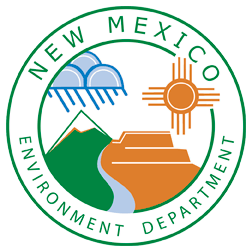The United States Environmental Protection Agency (“EPA”) Chief Information Office (“CIO”) issued CIO 2105-P-01.4, Environmental Information Quality Procedure to implement the requirements of CIO policy 2105.4 Environmental Information Quality Policy and 2 CFR 1500.12 Quality Assurance. According to EPA policy (CIO 2105.4) and federal requirements (2 CFR 1500.12), all environmental programs performed by EPA or directly for EPA, through EPA-funded extramural agreements, shall be supported by individual quality assurance systems that comply fully with EPA policy and are consistent with the Quality Management Systems for Environmental Information and Technology Programs (ASQ/ANSI E4 2014).
Therefore, to meet the requirements of EPA policy CIO 2105.4 and to comply with 2 CFR 1500.12, the NMED SWQB is required to have a quality assurance system that is documented in a Quality Management Plan (“QMP”). Thus, the NMED SWQB has developed a QMP that is consistent with EPA’s CIO 2105-P-01.4, Environmental Information Quality Procedure.
EPA also requires all organizations funded by EPA, that collect environmental data used in decision making, be supported by an EPA approved Quality Assurance Project Plan (“QAPP”).
In some cases, a QMP and a QAPP may be combined into a single document that contains both organizational and project-specific elements. The Region 6 Quality Assurance Manager for the organization sponsoring the work has the authority to determine when a single document is applicable.
For further information, contact Emily Miller.
Quality Management Plans
A QMP may be viewed as the ‘umbrella’ document under which individual projects are conducted.
The QMP is a management tool that documents an organization’s quality system for planning, implementing, documenting, and assessing the effectiveness of activities supporting environmental data operations and other environmental programs.
The SWQB shall review its QMP at least annually to reconfirm the suitability and effectiveness of the approved quality management practices. The process of developing, annually reviewing, and revising (as needed) the QMP, allows an opportunity for management and staff to clarify roles and responsibilities, address problem areas, and institutionalize improvements.
Requirements for QMPs are defined in EPA’s Quality Management Standard, CIO 2105-S-01.1.
The SWQB QMP for Environmental Information Operations may be accessed at here.
Quality Assurance Project Plans
A QAPP is the ‘blueprint’ by which individual projects involving environmental data are implemented and assessed and how specific quality assurance and quality control activities will be applied during a project.
The EPA has developed the QAPP as a tool for project managers and planners to document the type and quality of data needed for environmental decisions and to describe the methods for collecting and assessing those data. The QAPP integrates all technical and quality aspects of a project, including planning, implementation, and assessment.
The QAPP review and approval process vary by project and can be approved by EPA for up to 60-months. However, should there be any changes to the project at any time, a revised QAPP must be submitted to EPA for review and approval. If a project continues under a new cooperative agreement and there are no substantive technical or programmatic changes to project, a letter with SWQB approval needs to be submitted to EPA stating that no changes are needed. The letter or revised QAPP is due at least 60 days prior to the expiration date of the EPA approved QAPP.
Requirements for QAPPs are defined in EPA’s Quality Assurance Project Plan Standard, CIO 2105-S-02.1.
Link to a list of EPA approved SWQB QAPPs.
Field Sampling Plans
Field Sampling Plans (FSPs) serve as the comprehensive planning record for each individual project. The FSP incorporates and documents the results of the Planning Process also known as Systematic Planning listed in the EPA Environmental Information Quality Procedure (CIO 2105-P-01.4).
Not all projects require an FSP. If a project-specific QAPP has sufficient details regarding the sampling plan, then a separate FSP is not needed (see current SOP on Developing FSPs for details). The SWQB QAPP for Water Quality Management Programs outlines water quality monitoring activities which require additional documentation through an FSP.
Standard Operating Procedures
For routine work across multiple projects the SWQB has established Standard Operating Procedures (SOP) to maintain consistency with data collection activities. All personnel who collect environmental data must be familiar with these protocols, sign acknowledgment forms associated with specific SWQB SOPs and collect data in accordance with the procedures as they are defined in the SOPs. Sampling and analytical techniques shall conform with 20.6.4.14 New Mexico Administrative Code (“NMAC”) unless otherwise specified by the Water Quality Control Commission pursuant to a petition to amend these standards (i.e., 20.6.4.14 NMAC).
A list of SWQB SOPs can be found here.

